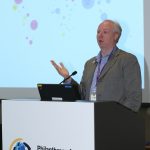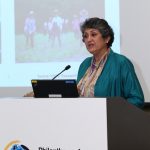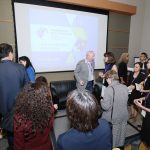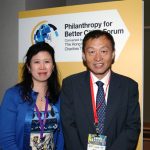Speakers:
- Richard Brubaker Founder, Collective Responsibility
- Cherie Nursalim Vice Chairman, Giti Group
- Malini Thadani Head of Corporate Sustainability, Asia Pacific, The Hong Kong and Shanghai Banking Corporation Limited
Facilitator:
- Lisa Genasci CEO and Founder, ADM Capital Foundation
Presentation Slides – 1
Presentation Slides – 2
Over half the world’s population live in urban areas, consuming 78% of the planet’s total energy and producing 60% of its greenhouse gas emissions. The sustainability of our communities, businesses and organisations is key to minimising our impact on the environment and safeguarding our future quality of life.
Ms. Genasci stated that most agree that climate change is now a planetary threat, particularly in urban areas, yet currently only 2 to 3 percent of philanthropic funds in Asia are allocated to environmental issues. There is a role for philanthropy to play a catalytic role for systemic change, whether as individuals, businesses or via cross-sectoral partnerships.
She added that philanthropists can start the conversation, take risks that are difficult for government and businesses in piloting ideas and projects. In many cases, philanthropists may sometimes not be clear if their initiatives would work. But they knew they wanted to be effective, to test out partnerships, to take risks, and to manage along the way via trial and error. Moreover, as the themes of sustainability and environment themselves are broad, they look for those points of leverage and strategic triggers that will foster the larger systemic change or awareness that is needed to move things forward.
Mr. Brubaker stated that urbanization is the trend that has defined a lot of the opportunities and challenges we are facing today. A lot of this is mainly driven by economics – if you put one person in a city, you get four times GDP multiplier. The pace of urbanization and its related needs for infrastructure, food, health and other necessities is the framework on how we can and should make cities to be sustainable systems. And the role of philanthropy in this context. He reiterated that the pressures on systems are moving at an unprecedented scale that we need have a holistic grasp in order to keep up. The basics of philanthropy or CSR, paying taxes, providing jobs are all good but the fact is that we need to change business models and shift mindsets in order to tackle sustainability issues.
Ms. Thadani’s perspective is that their work in tackling sustainability issues of the communities in which her organization operates is also helping themselves to be more sustainable as a business. Their philanthropic support are in five year cycles that more closely mirror the cycles for system impacts in sustainability and environment. Her organization’s choice in tackling water risks is something that is critical in avoiding its disruptions to human life, and to nature, but also in describing its implications on business operations.
Ms. Nursalim spoke about the linkages of philanthropy to the United Nations Sustainable Development Goals (SDGs) as well as the importance to focus on happiness and well-being. This is necessary in order to have solutions that unite across the diversity of sectors and players via innovative partnerships to achieve the happiness and well-being goals as reflected by commitments to the SDGs.
The panelists echoed that tackling sustainability and environmental challenges are imperatives for sustainable, better cities. Partnerships, innovations in being able to take risks, shifting mindset towards a holistic view of the challenges will enable further collective actions and impacts for a more sustainable society in and for the future.







